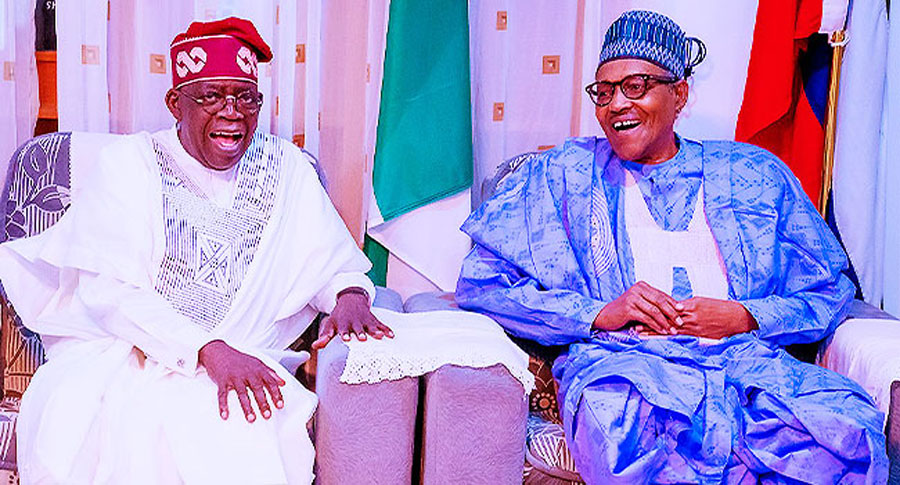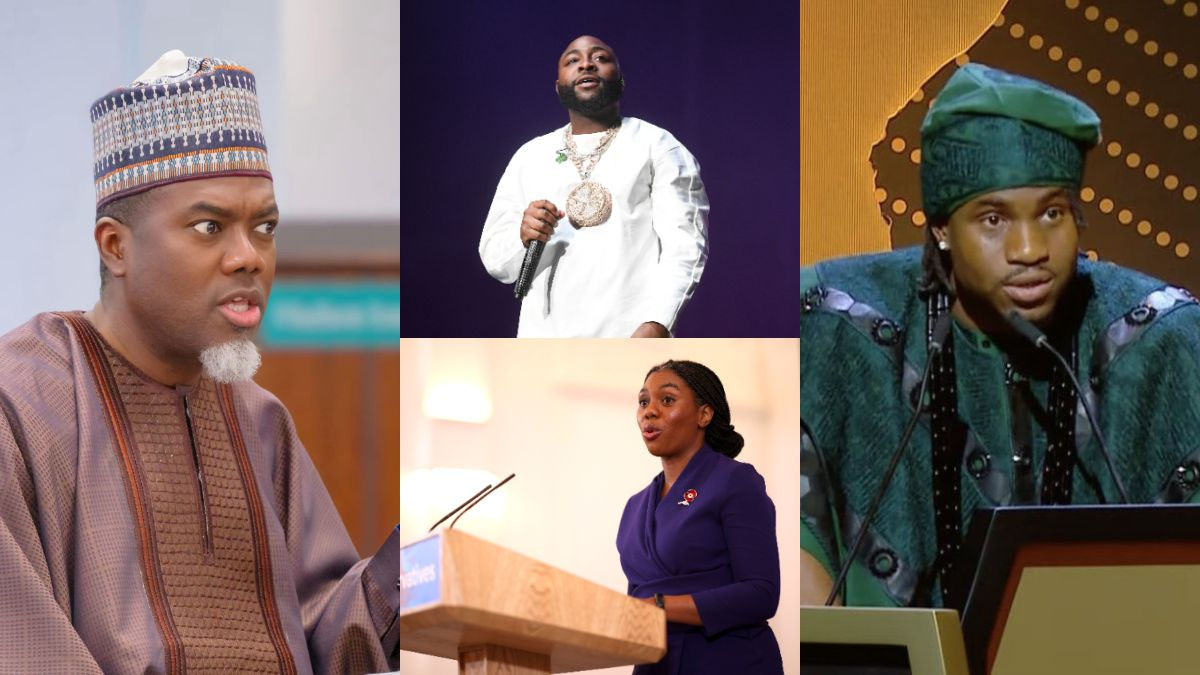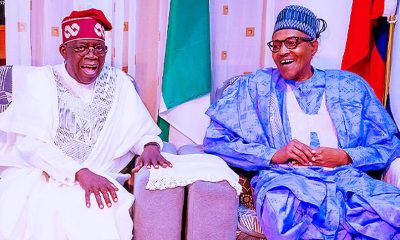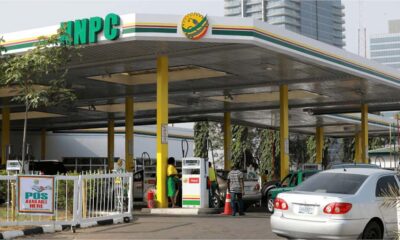Opinion
Is Nigeria truly under a spell? By Simon Kolawole

Is Nigeria truly under a spell?
By Simon Kolawole
In the dying days of his administration in 2007, President Olusegun Obasanjo sold 51 percent of federal government’s stakes in two of Nigeria’s four ailing refineries to Bluestar Oil Services Ltd — a consortium floated by Dangote Oil, Zenon Oil and Transcorp Plc — for $761 million. Shortly after the inauguration of a new administration, the oil industry unions — apparently prompted — kicked that Obasanjo sold the refineries to his cronies, insisted that one of the refineries alone was worth over $5 billion, and staged a four-day strike. President Umaru Musa Yar’Adua gleefully reversed the privatisation and returned the refineries to the Nigerian National Petroleum Corporation (NNPC).
Alhaji Abubakar Lawal Yar’Adua, appointed the NNPC group managing director by President Yar’Adua, told the world in September 2007 that all our refineries would start working at “near full capacity” by December 2007 after “rehabilitation” which, you may want to know, cost us several billions of naira. In preparation for the magic, he said government had awarded a $52 million contract for the repair of the Chanomi Creek pipeline, the main feeder pipeline to Warri and Kaduna refineries blown up by militants in 2006. All was set for the amazing revamp of the 445,000 barrels per day (bpd) refineries, after which we would stop importing petroleum products and live together happily ever after.
What happened next? We are now in September 2023 — on the 16th anniversary of Yar’Adua’s monumental promise — and Nigeria is still waiting for the magic to happen. (As an aside, Yar’Adua was named in the Panama Papers to have secretly bought an £890,000 house in London in 2008 while serving as the NNPC GMD, using a company he registered in the British Virgin Islands — but there is nothing to see there).
Sixteen years after the unions said the Port Harcourt refinery alone was worth $5 billion, no one would buy it for N5 million. Sixteen years after we bungled a major victory for local refining of petroleum products, we are still helplessly and hopelessly hooked on fuel imports.
But Yar’Adua was not alone. Every single president after him promised to get the refineries working at “near full capacity”. President Goodluck Jonathan vowed to raise the dead. Between 2013 and 2015, he reportedly spent $396 million on turnaround maintenance (TAM) — and the refineries have still not worked, although I admit that the fortune of a few individuals experienced turnaround miracles.
In April 2021, Mallam Mele Kyari, the CEO of NNPC Ltd, followed the enviable tradition of his predecessors by signing a $1.5 billion contract to rehabilitate the Port Harcourt refinery. President Bola Tinubu has now customarily promised that the refineries will be back by December 2023.
In summary, 16 years after we reversed the sale of the refineries because they were bought by Obasanjo’s “cronies” and promised to get them back to “near full capacity”, we have burnt billions of dollars on TAM contracts and we are still here waiting patiently and enthusiastically for Godot. We are still promising to get the refineries to work “by December” (why always December?) and have no clue when this bizarre bazaar will be over. From the time of Gen Sani Abacha till date, all the presidents have played the same card of getting the refineries to work. It appears there is a hymn sheet at the Presidential Villa from which they all sing: the harmony is enduring and unbelievable.
But you know what? If you take a proper look at the financial and economic implications of fuel importation in Nigeria, you will find a damning explanation for some of the woes overwhelming us today. Shall we discuss the billions of dollars we have burnt on demurrage and storage charges on fuel imports since 1999 (because our ports do not have the adequate reception capacity and the NNPC does not have sufficient storage facilities)? Shall we discuss the fact that the resources we have burnt on demurrage and storage expenses over the same period could have built the biggest refineries in the world and turned us to exporters of both crude oil and petroleum products?
Does anyone ever calculate how much of our forex earnings we burn on fuel importation? This is the largest single consumer of forex today. I wonder what might have been if we had taken another route. When Obasanjo was president and we had considerable savings from oil revenue, I campaigned vigorously that we should invest in a new refinery. I was lectured by neo-liberal fanatics that government should not run a refinery, that it should be the business of the private sector. I conceded but with a request: let us build a refinery (since no investor was willing to do so), lease out the management and sell it off after some years. Let us just stop fuel importation by any means!
The cost of the decisions we took — or failed to take — yesterday is coming back to bite us hard today and threatening to pull down the already fragile economy. With dwindling oil output and export, we are currently facing a double whammy: we export little oil and spend the little income to import petroleum products because we do not refine at home. Things got so bad at a stage that we did not have enough crude to exchange for products, so we mortgaged future oil production in order to import petrol for today. We are digging one hole after the other to fill the other holes we have dug everywhere. It is difficult to understand how we do things here and expect positive outcomes.
Help me make sense of this. A farmer produces yams and sells a tuber for N2,000 to Mama Put. But because he does not have the mortar and pestle to pound the yam, he goes to the Mama Put to buy a wrap of pounded yam for N1,000. Mama Put can probably make N10,000 per tuber, selling it as pounded, fried, boiled or roasted yam, or making yam flour and amala from it. Mama Put can sell the peels as feed for goats. There are several products from yam! Now, wait for this: our farmer friend runs into a harvest problem and starts buying pounded yam on credit, promising to pay with next year’s harvest. That is Nigeria for you: selling crude oil and spending the revenue to import petrol.
The country should be exporting petroleum products — such as petrol, diesel, low pour oil fuel, and jet fuel — and earning billions of dollars, in addition to the little matter of jobs and tax revenue. We want the naira to exchange at N1/$1 (whatever the merits are) but how can you spend all your forex on importing petrol and still expect the naira not to keep losing value? What else are you exporting to earn dollars? Where are the dollars? If income from your biggest export, which used to account for 90 percent of your forex earnings, has been going down for years, what else are you doing to get more dollar inflow into your economy? It seems we are expecting the dollar to fall from heaven.
Let us go to Singapore briefly. The country is less than the size of Lagos state and has a population of 5.6 million. But we are not here to discuss land mass and population. My interest is the size of the intellect. The country does not have oil but it has some of the biggest refineries in the world with the capacity to refine 1.5 million bpd. Nigeria, one of the world’s richest in crude reserves, has been having the capacity for 445,000 bpd since 1987 and rarely refines a barrel. Singapore is regarded as Asia’s oil hub and earned $40.8 billion from exporting refined petroleum products in 2021. Yes, $40.8 billion! It is not about resource wealth or political system. It is the brain. Vision. Mission. Passion.
What more can I say? Ajaokuta Steel Mill has become a centre of stealing since it was conceived in 1979. Up till today, we have not finished stealing through Ajaokuta. If it was a country where our heads were properly screwed on our necks, we would be earning billions of dollars from exporting iron and steel, to say nothing about the jobs and the value chain in the economy. According to data by CEPII, the leading French centre for research and expertise on the world economy, China earned $61 billion from iron and steel exports in 2021. Japan earned $35 billion, Germany $32.8 billion, Russia $30.5 billion, and South Korea $28 billion. These things start from the brain. It is not magic.
Don’t let us get started with palm oil. Forget the legendary story of how an Asian country came to take palm seedlings from Nigeria some decades ago and is now a world leader in the production of the cash crop. As far as I am concerned, that is history and we should move on for Pete’s sake. The part I cannot understand for the life of me is why we keep lamenting as if lamentation ever solved any problem. There are more depressing statistics to share with us but I think we can chew on this for a while: in 2022, Indonesia earned $27.8 billion from palm oil exports alone. I am attracted by the enormous forex earnings for sure, but I am more smitten by the associated economic activities.
Let’s be frank: the solution to our economic and security challenges are hidden in plain sight. It is no rocket science. Nigeria can be one of the biggest exporters of palm oil, petrol, solid minerals, name it — if we use our brains positively. We have no business with being a net importer of petroleum products, so much so the aviation industry is sometimes paralysed because of fuel scarcity. Nigeria is the only country that experiences this constant affliction. Some things are too weird about us. That is why some think the country is under a spell. I can’t say if it is a spiritual problem because spiritual matters are above my paygrade, but I am sure that we don’t know what we are doing. We’re lost.
But when you see that some sectors are doing well — fintech and entertainment, for instance — in spite of the government, you cannot but conclude that the political leadership has questions to answer. We have a warped concept of governance. When you run a system where the unwritten code is that leadership is all about personal comfort and there are no consequences for bad behaviour, what you get is a Nigeria. We know what ails us. It’s been well diagnosed. But we have refused to take our medication: competent and patriotic leadership at all levels. Our capacity for shortsightedness and selfishness is legendary and damaging. Do I really need to spell that out again?
AND FOUR OTHER THINGS…
GABON GARRISSON
Gabon is the latest African country to come under the jackboot with the overthrow of President Ali Bongo Ondimba shortly after he was declared winner of a flawed election that returned him to office for a third term. He had succeeded his late father, Omar, in 2009. I was amused that father and son had ruled Gabon for a combined period of 56 years before the military coup — only for me to read reports that the new military ruler, Brigadier General Brice Oligui Nguema, is the ousted president’s cousin. I didn’t know whether to be angry or burst into laughter. I now can’t say what is more odious — the father-and-son stranglehold on Gabon or the incursion by their extended family. Africa!
COUP CONTAGION
Military coups are back in full force in Africa and I must be one of the least excited. I will say this one more time: military should stay out of politics.
By their training and orientation, soldiers are not primed to govern the civil populace. Most of Africa was ruled by soldiers in the 1970s and 1980s and if they were geniuses, Africa would be competing with the rest of the world today. I will never argue against the notion that there is a general leadership problem on the continent. I will also not deny the fact that liberal democracy has not delivered the dividends as it should. But the military has not proved itself to be better either. Let’s give democracy a chance, no matter how imperfect. Liberties.
ALL EYES ON P&ID
There are underground moves by some selfish Nigerians to cut a deal in the P&ID case by seeking to arrest the British high court judgment. The facts, according to our lawyers, are positive for us. More so, we have a right of appeal if we lose, so it is difficult to understand why some fellows are trying to stampede President Bola Tinubu to go for out-of-court settlement. If we win, P&ID and its backers will not get a penny. Instead, the court may ask them to pay our costs. It is already a good signal that a court allowed us to challenge the $6.6 billion (plus interests) award because of allegations of corruption in the contracting process. Tinubu must not cave in to these commission chasers. Greed.
AND FINALLY, DAPO ABIODUN VS WALE ADEDAYO
Mr Wale Adedayo, chairman of Ijebu East LGA, Ogun state, bluntly told Mr Dapo Abiodun, the governor, that the “emperor has not clothes”. He accused the governor of hijacking the funds meant for councils — a major obstacle to the proper functioning of the local government system in Nigeria.
The emperor was very angry. Councillors from Ijebu East quickly visited the emperor with their tails between their legs, apologising for Adedayo’s misdemeanour, and wailing: “We are sorry sir! The emperor has clothes! The emperor is not naked!” Seven councillors proceeded to suspend Adedayo for three months over allegations of maladministration and financial mismanagement. Nigeria!

- Kolawole is the founder and chief executive officer of Cable Newspaper Limited
Opinion
Tinubu’s Buharization of NNPC By Farooq Kperogi

Tinubu’s Buharization of NNPC by Farooq Kperogi
After the sustained, unwarranted personal attacks I endured for eight years from northerners for unswervingly calling out what I called the “embarrassingly undisguised Arewacentricity of Buhari’s appointments” in a February 2, 2019, column titled “Even Ahmadu Bello Would Be Ashamed of Buhari’s Arewacentricity,” I promised that I would look the other way if a southern president returned the favor after Buhari’s tenure.
But promises made in the heat of disillusionment often crumble under the weight of principle.
Ironically, this column was inspired by a well-regarded Yoruba supporter of President Bola Ahmed Tinubu who is worried, in fact embarrassed, by the optics of what he says is Tinubu’s relentless Yorubacentric take-over of the Nigerian National Petroleum Company (NNPC).
His concern wasn’t just partisan discomfort; it was a profound unease about how this nepotistic approach undermines national cohesion.
I frankly hadn’t been paying attention to the internal dynamics at the NNPC, but the acquaintance pointed out that Yoruba people now occupy major positions at the NNPC and that a certain (person) is “being proposed as GMD after Mele Kyari’s term expires” early next year.
I haven’t independently confirmed the accuracy of this claim but given the closeness of the source of information to people in the circles of power, it’s probably best to not dismiss this with the wave of the hand.
His concern is that Tinubu, from the Southwest, is already the minister of petroleum. Senator Heineken Lokpobiri, the Minister of State for Petroleum and Chairman of the NNPC, is from the South-South. Chief Pius Akinyelure from the Southwest is NNPC’s Non-Executive Board Chairman.
READ ALSO:
- Lagos Imam to Tinubu: You haven’t disappointed us
- Ronaldo, Vinicius, Yamal win big at 2024 Globe Soccer Awards [Full list of winners]
- Vinicius should have won Ballon d’Or, not Rodri – Ronaldo
The head of the NNPC Upstream Investment Management Services (NUIMS), Mr. Bala Wunti, my acquaintance pointed out, has been replaced by one Seyi Omotowa. Gbenga Komolafe is the chief executive officer of the Nigerian Upstream Petroleum Regulatory Commission (NUPRC), making him the highest-ranking upstream regulator.
“If a Yoruba man were to be the GMD, another Yoruba man is the Chairman, and yet another Yoruba man is the regulator, that’s extreme lopsidedness,” and other parts of Nigeria would be justified to feel uncomfortable, my acquaintance said.
As with issues of this nature, the reality may be more complex that the surface-level impressions that I have been presented with. Of the 12-member non-executive Board of Directors, I counted at least four names that I recognize as northern, and that includes Kyari, the outgoing GMD.
The 7-member Senior Management Team on NNPC’s website has three northerners (if Kyari is included). That seems fair. Plus, Buhari actually appointed many of the Yoruba people in high places at the NNPC. By these metrics, one might argue that there’s a semblance of balance.
However, Tinubu’s broader public image tells a different story. His administration is rapidly cementing a reputation for Yorubacentric provincialism. Like the late Umaru Musa Yar’Adua, who governed Nigeria as if he were still a Katsina governor, Tinubu appears to be governing Nigeria as though he were still the governor of Lagos.
Just like Yar’adua was elected a Nigerian president but operated like a Katsina governor in Abuja, Tinubu is also, so far, a Nigerian president only in name. His mindset is still that of the governor of Lagos.
With a few notable (and in some cases unavoidable) exceptions, Tinubu’s government is largely the re-enactment of his time as the governor of Lagos. It is, for all practical purposes, an unabashed Lagos-centric Yorubacracy.
To be fair, though, with the possible exception of Olusegun Obasanjo’s administration, all civilian regimes since 1999 have been insular ethnocracies.
My source reminded me of a viral social media post I wrote on January 14, 2019, titled “New IGP: Why Progressive Northerners Should be Embarrassed” where I gave four reasons for being insistently censorious of Buhari’s Arewacentric appointments in response to southerners who asked why I was bothered since I was a northern Muslim who was “favored” by such appointments—“favored,” that is, on the emotional and symbolic plane.
READ ALSO:
- Nigeria Customs Service begins 2025 recruitment [How to apply]
- Dangote, Tinubu, Lookman, Badenoch named among 100 most influential Africans in 2024
- Heavy security in Ilesa as ex-Osun deputy gov emerges new Owa-Obokun
I pointed out that I criticized similar such parochial appointments by previous presidents from the South and that it would be hypocritical to look the other way because I was now “favored” by such appointments.
I said people from my region and religion won’t always be in power, and I wanted to be able to stand on a firm moral pedestal when I criticize future presidents who replicate Buhari’s (and previous presidents’) provincialism.
Most importantly, I said, I was personally embarrassed by Buhari’s insularity and that every progressive northerner should be. I described it as the sort of embarrassment you feel when your best friend who thinks highly of your mother visits you in your home and your mother, during a family dinner, gives you a considerably bigger food portion size and choicer pieces of meat than your friend.
“You feel like screaming: ‘Mom, I know you love me, but you’re embarrassing me by showing overt preferential treatment to me in the presence of my friend’,” I wrote.
The Yoruba acquaintance of mine who alerted me to the creeping Yoruba-centric take-over of the NNPC said he was doing so out of a feeling of the same sense of embarrassment that inspired my rage against Buhari’s appointments that favored the North unfairly, especially in the areas of security.
Tinubu is doing in the economy sector what Buhari did in the security sector. The minister of finance, the governor of the central bank, and every other consequential agency in finance is headed by a Yoruba man. I am not sure Nigeria has ever seen this level of extreme, state-sanctioned ethnocentric domination of a critical segment of national life.
Appointing another Yoruba individual as the head of the NNPC would complete what many already perceive as the ethnic capture of Nigeria’s economic nerve center. It would not only cement Tinubu’s image as an insensitive ethnocrat but also exacerbate public discontent and foster deeper divisions in an already polarized nation.
If Tinubu is unaware of this burgeoning perception, he needs to awaken to its reality. Leadership is not just about policies and actions; it’s also about managing optics and inspiring confidence in a nation’s collective identity.
In a September 5, 2015, column titled “Buhari is Losing the Symbolic War,” where I railed against the exclusion of Igbo people in Buhari’s first appointments, I wrote:
“Symbolism isn’t the same thing as substance. Appointing people to governmental positions does nothing to improve anybody’s lot—except, perhaps, the people so appointed and their immediate families.
“Jonathan’s disastrous 5-year presidency couldn’t even bring basic infrastructure like boreholes to his hometown of Otueke, yet his people derive vicarious satisfaction from the fact of his being Nigeria’s former president.
“Human beings are animated by a multiplicity of impulses, including rational and emotional impulses, both of which are legitimate. When we turn on our rational impulses, we may ask: What would appointing an Igbo man as SGF, for instance, do to Igbo people? The answer is ‘nothing.’
“But we are more than rational beings: we are also emotional beings. That’s why people are invested in symbolism. Appointing someone from the southeast or the deep south is merely a symbolic gesture, but it inspires a sense of inclusion in the minds of many people from that region; it serves as a symbolic conduit through which people vicariously connect with the government.”
This cycle of ethnic favoritism must end if Nigeria is to realize its full potential as a nation. To grow and thrive, we need leaders who can transcend the narrow confines of ethnocracy.
We need leadership that embraces diversity and inclusion, not as buzzwords but as guiding principles for governance. Only then can we begin to heal the fractures that divide us and build a nation that serves all its citizens, regardless of ethnicity or region.
Farooq Kperogi is a renowned Nigerian columnist and United States-based Professor of Media Studies.
Tinubu’s Buharization of NNPC by Farooq Kperogi
Opinion
Ademola Lookman showed Davido and Kemi Badenoch that wisdom is not by age – Omokri

Ademola Lookman showed Davido and Kemi Badenoch that wisdom is not by age – Omokri
Recently, the singer David Adeleke was given a global stage to do whatever he wanted and deliver any message.
Sadly, Mr. Adeleke used the opportunity to speak in an American accent. Not only that, he used that American accent to talk down on Nigeria and tell the world not to invest in Nigeria because, as he put it, Nigeria’s “economy is in shambles”.
Coincidentally, a month after his faux pas, Kemi Badenoch, probably inspired by Davido, used her British accent to talk down Nigeria, calling us “a very poor country” where the police rob citizens.
But the interesting thing about her own case is that the next day, the BBC featured a panel of Conservative Party big shots, and one of them, Albie Amankona, a party chieftain from Chiswick, who is also a celebrity broadcaster, said, and this is a direct quote:
“If you are a Brexiteer, and you are saying we need to be expanding our global trade beyond the European Union, we want to be looking at emerging markets for growth, don’t slag off one of the fastest growing economies in Africa.”
Is it not strange that it took the BBC and a British politician to promote Nigeria as one of the fastest-growing economies in Africa?
And just when we thought it was all bad news, God gave us a breath of fresh air in the youthful Ademola Lookman, who used the global podium granted to him by his winning the 2024 African Footballer of the Year award to promote and project Nigeria and the Lukumi Yoruba language to the world.
READ ALSO:
- MURIC tackles Kemi Badenoch: Can you bring UK police when coming to Nigeria?
- Reps probe $754.2m, N141.6bn tractors, harvesters contract fraud
- Gov Adeleke intervenes in man sentenced to death for stealing fowl (Video)
Wisdom is not by age. If not, Ademola Lookman, who is just twenty-seven, will not have displayed greater wisdom than David Adeleke, who is thirty-two, and Kemi Badenoch, at forty-four.
Mr. Lookman proved that the age of Methuselah has nothing to do with the wisdom of Solomon.
And it is not as though other ethnicities with global icons do not also project Nigeria. They do.
Dr. Mrs. Ngozi Okonjo-Iweala spoke Igbo on the podium of the WTO in Geneva. In terms of prestige, she is FAR above Lookman.
My campaign is not for the Lukumi Yoruba alone. It is for all sub-Saharan Black Africans to learn to speak their language and not use ability to speak English or another colonial language as a measure of intelligence.
Besides Lukumi Yoruba and Hausa, every other Nigerian language, including Fulfulde, is gradually dying out.
General Buhari is half Fulani and half Kanuri. Yet, he cannot speak either Fuifulde or Kanuri. But he speaks Hausa and English.
Fact-check me: In 2012, UNESCO declared Igbo an endangered language.
However, the Lukumi Yoruba are to be commended for their affirmative actions to advance their language and culture.
Let me give you an example. All six Governors of the Southwest bear full Lukumi names: Jide Sanwa-Olu, Seyi Makinde, Dapo Abiodun, Ademola Adeleke, Abiodun Oyebanji, and Orighomisan Aiyedatiwa.
No other zone in Nigeria has all its governors bearing ethnic Nigerian names as first and second names. They either bear Arabic or European names as first names or even first and second names.
If we truly want to be the Giant of Africa, we must take affirmative steps to preserve our language and culture so we can have children like Ademola Lookman.
Teach your language to your children before you teach them English. They will learn English at school. Being multilingual is scientifically proven to boost intelligence.
Fact-check me: In the U.S., Latino kids do not speak English until they start school. They learn Spanish as a first language.
Even if you relocate to the UK, the best you can be is British. You can never be English. And if your choice of Japa is the U.S., the highest you can be is an American citizen. You will never become a White Anglo-Saxon Protestant WASP.
Your power lies in balancing ancient and modern, Western and African, English (or other colonial languages) and your native tongue.
That is the way to reverse language erosion, like the Lukumi Yoruba.
Ademola Lookman showed Davido and Kemi Badenoch that wisdom is not by age – Omokri
Opinion
Kemi Badenoch’s Hate for Nigeria – Femi Fani-Kayode

Kemi Badenoch’s Hate for Nigeria – Femi Fani-Kayode
“I find it interesting that everyone defines me as a Nigerian. I identify less with the country than with my specific ethnic group. I have nothing in common with the people from the north of the country, the Boko Haram, where Islamism is. Being Yoruba is my true identity and I refuse to be lumped with the northern people of Nigeria who were our ethnic enemies, all in the name of being called a Nigerian”- @KemiBadenoch.
Dangerous rhetoric
Kemi Badenoch, MP, the leader of the British Conservative Party and Opposition in the @UKParliament, has refused to stop at just denigrating our country but has gone a step further by seeking to divide us on ethnic lines.
She claims that she never regarded herself as being a Nigerian but rather a Yoruba and that she never identified with the people from the Northern part of our country who she collectively describes as being “Boko Haram Islamists” and “terrorists”.
This is dangerous rhetoric coming from an impudent and ignorant foreign leader who knows nothing about our country, who does not know her place and who insists on stirring up a storm that she cannot contain and that may eventually consume her.
It is rather like saying that she identifies more with the English than she does with the Scots and the Welsh whom she regards as nothing more than homicidal and murderous barbarians that once waged war against her ethnic English compatriots!
All this coming from a young lady of colour that is a political leader in a multi-ethnic, multi-religious and multi-cultural country that lays claim to being the epitome of decency and civilisation! What a strange and inexplicable contradiction this is.
READ ALSO:
- CCT chair removal: Civil groups sue Tinubu, Akpabio, others
- New President-General of Ohanaeze Chukwu to reign for 27 days
- Economy: I derive no pleasure in causing Nigerians pain, says Tinubu
Her intentions are malevolent and insidious and her objective, outside of ridiculing and mocking us, is to divide us and bring us to our knees.
I am constrained to ask, what on earth happened to this creature in her youth and why does she hate Nigeria with such passion?
Did something happen to her when she lived here which she has kept secret?
Kemi Badenoch’s Hate for Nigeria – Femi Fani-Kayode
-

 News3 days ago
News3 days agoNigeria Customs Service begins 2025 recruitment [How to apply]
-

 metro3 days ago
metro3 days agoLagos Imam to Tinubu: You haven’t disappointed us
-

 Sports3 days ago
Sports3 days agoRonaldo, Vinicius, Yamal win big at 2024 Globe Soccer Awards [Full list of winners]
-

 Africa2 days ago
Africa2 days agoNiger’s president faces fire at home over attack on Nigeria
-

 International2 days ago
International2 days agoBashar Assad relatives arrested while trying to fly out of Lebanon
-

 Opinion3 days ago
Opinion3 days agoTinubu’s Buharization of NNPC By Farooq Kperogi
-

 Politics1 day ago
Politics1 day agoGbajabiamila speaks on his rumoured Lagos governorship ambition
-

 metro2 days ago
metro2 days agoWe’re not aware of VeryDarkMan’s missing N180m — Police











